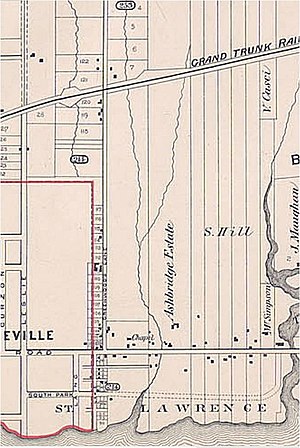Ashbridge's Creek (Lake Ontario): Difference between revisions
Jump to navigation
Jump to search

George Swan (talk | contribs) m (George Swan moved page Ashbridge's Creek to Ashbridge's Creek (Lake Ontario): disambiguation) |
mNo edit summary |
||
| (5 intermediate revisions by one other user not shown) | |||
| Line 1: | Line 1: | ||
{{subpages}} | {{subpages}} | ||
[[File:Detail of an 1884 Goad's Atlas, showing Ashbridge's Creek.jpg | thumb | Ashbridge's Creek in 1884]]'''Ashbridge's Creek''' was a watercourse | [[File:Detail of an 1884 Goad's Atlas, showing Ashbridge's Creek.jpg | thumb | Ashbridge's Creek in 1884]]'''Ashbridge's Creek''' was a watercourse formerly existing in [[Toronto, Ontario]]. It flowed into [[Ashbridge's Bay]] between the [[Don River, Ontario|Don River]] and [[Highland Creek]].<ref name=BeachesLivingLostRivers/><ref name=VanishingPoint/><ref name=SpotALostRiver/> Its headwaters were north of [[Greenwood Avenue, Toronto|Greenwood]] and [[Danforth Avenue, Toronto|Danforth]] avenues, making it about {{convert|4|km|miles}} long. In 1909, the creek was buried and converted to a [[sewer]], together with nearby [[Small's Creek (Ontario)|Small's Creek]], and [[Tomlin's Creek]], shortly after the communities they ran through were annexed by the growing city of [[Toronto]].<ref name=VanishingPoint/> | ||
Portions of a fence the Ashbridge family erected along the creek to keep their cattle from polluting it survive to the present day near [[Craven Road]].<ref name=LeslievilleHistorical/> | |||
Portions of a fence the Ashbridge family erected along the creek | |||
==References== | ==References== | ||
| Line 56: | Line 54: | ||
}} | }} | ||
</ref> | </ref> | ||
}} | }}[[Category:Suggestion Bot Tag]] | ||
Latest revision as of 11:01, 13 July 2024
Ashbridge's Creek was a watercourse formerly existing in Toronto, Ontario. It flowed into Ashbridge's Bay between the Don River and Highland Creek.[1][2][3] Its headwaters were north of Greenwood and Danforth avenues, making it about 4 km (2.49 miles) long. In 1909, the creek was buried and converted to a sewer, together with nearby Small's Creek, and Tomlin's Creek, shortly after the communities they ran through were annexed by the growing city of Toronto.[2]
Portions of a fence the Ashbridge family erected along the creek to keep their cattle from polluting it survive to the present day near Craven Road.[4]
References
- ↑ Lost Rivers of the Beach, Beaches Living. “The last lost creek crossed Queen St. on the grounds of the lovely gingerbread Ashbridge family estate at 1444 Queen St. East, just east of the family house.”
- ↑ 2.0 2.1 Michael Cook. Beneath Toronto's East End: The East Toronto and Midway Sewer System. Vanishing Point. Retrieved on 2016-08-01. “Up until 1908, Toronto's city limit ended just east of Greenwood Ave., on the western shoulder of the Ashbridges Creek ravine, save for a narrow strip the city had already claimed along the lakeshore as far as Balmy Beach.”
- ↑ Chris Bateman. How to spot a lost river in Toronto, Blog TO, 2014-02-01. “The stream still flows, though it's been buried, contained, and diverted since the Ashbridge Estate, a sprawling farm that used to occupy the land, was subdivided in the early years of the 1900s. Listen to the drains on Woodfield Road just south of Monarch Park and the roar of caged waterway is still clearly audible en route to the Ashbridge's Bay Wastewater Treatment Plant.”
- ↑ Craven Road Fence, Leslieville Historical Society. Retrieved on 2017-12-06. “The Ashbridge Estate stretched from Queen Street to Danforth Avenue and Ashbridges Creek flowed through it down to Ashbridge’s Bay. The Ashbridges lined the creek with fences to keep the cattle from polluting the water.”
